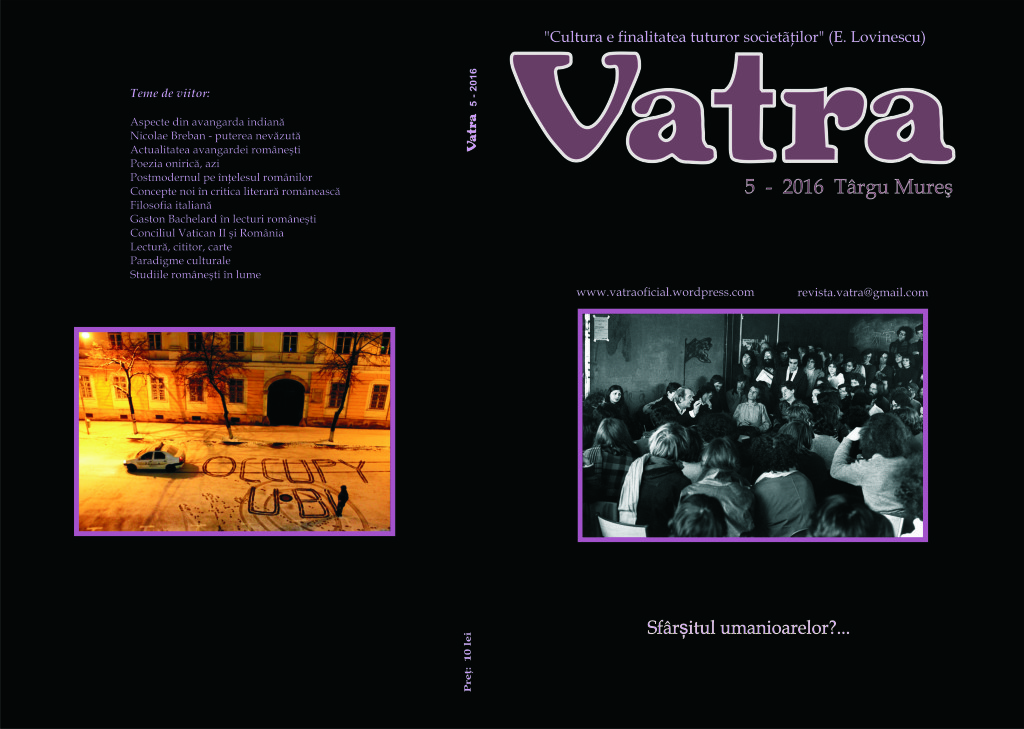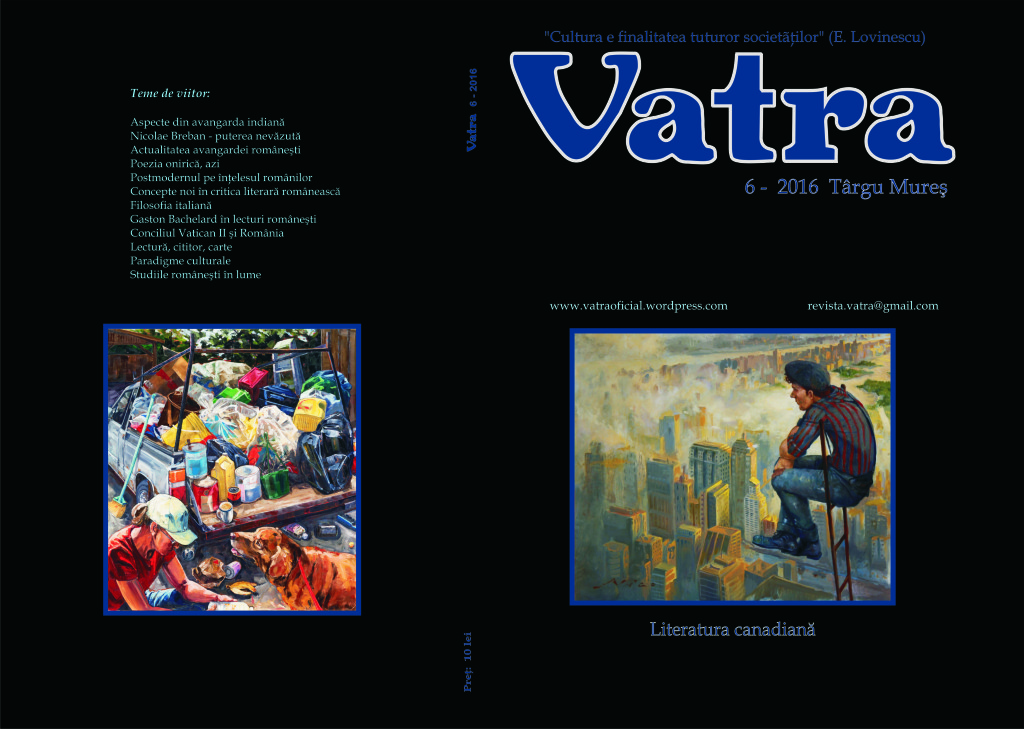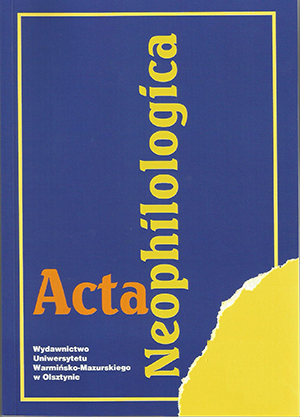
Se surpă în noi aparențele
The essay aims to investigate the evolution of the poetic vision of an important Romanian poet, Aurel Pantea, as he moves from the attitude of the warrior-poet, to that of a prophetic-poet.
More...We kindly inform you that, as long as the subject affiliation of our 300.000+ articles is in progress, you might get unsufficient or no results on your third level or second level search. In this case, please broaden your search criteria.

The essay aims to investigate the evolution of the poetic vision of an important Romanian poet, Aurel Pantea, as he moves from the attitude of the warrior-poet, to that of a prophetic-poet.
More...
In this paper we provide an overview of some of the distinctive characteristics of the short stories of Alice Munro, winner of the 2013 Nobel Prize for Literature. Through a close reading of a number of her representative works, we attempt at highlighting the intersections between them and the tradition of the modern Gothic (in particular, the Southern Ontario Gothic), as well as the unique way in which the Canadian writer approaches the problematic of the liminal (understood as the locus where the material and spiritual are conflated) by rooting the narrative act in the fragile space delimited by “punctuating” and “shifting”.
More...
Identity and its different notional implications are keyleitmotifs in many Canadian literary writings as a result of Canada’s complex and distinctive historical and cultural context. Starting from Northrop Frye’s theory on garrison mentality and Margaret Atwood’s Survival, this paper explores the concept of identity and its intricate connections with storytelling in Canadian literature by focusing on particular authors in whose texts the search for an identity occupies a central position.
More...
The article is an analytical approach to the 2007 Gaspereau edition of the well-known Canadian posmodernist George Elliot Clarke's Trudeau: Long March / Shining Path. Considered together, the book’s explanatory texts and the verse drama / libretto convincingly (de/re)construct the Canadian premier Pierre Elliott Trudeau's personality, his rise-and-fall in a worldwide historical, political, and cultural context, viewed from different vantage points. Though Clarke's new libretto for a jazz opera in collaboration with composer D. D. Jackson bears the “mask” of a classical five-act verse drama, it is actually a hybrid, transgressing the border of genres and corresponding to Linda Hutcheon’s mode of historiographic metafiction. Part and sequel of an extensive study of cultural polyphony in Clarke’s work, the article offers the Romanian readership an insight into Canadian multiculturalism in a moment when the late Pierre Elliott Trudeau's son Justin has become Canada's premier.
More...
“The Diviners” is the final and sovereign piece in Laurence’s Manawaka cycle. To think of Laurence’s novel in terms of what is peculiarly Canadian about it, brings forth the idea of identity and the compulsive concern with what can be generally denominated as survival, understood both in the sense of struggle towards the preservation of the self in a world perceived if not as hostile, at least as tough and contrary to individual interests or aspirations; the continuity of the tribe, of the people, within a physical geography; and in the sense of cultural endurance, conservation of the ancestors’ arsenal of spiritual values, their moral legacy. Margaret Laurence’s novel is not exempt from the “obsessions” which haunt the Canadian collective consciousness.
More...
At the beginning of the Meiji Era, Japan underwent a process of extensive modernization. Preeminent writers’ works were imported and translated into Japanese to serve as models for the new society that was envisioned as the future Japan. The presence of realism, objectivism and the protagonists’ adherence to social norms were deciding factors as to whether a literary work was adopted as such or not. Jane Austen’s emphasis on behavioural codes resonates with the Japanese proclivity to adhere to strict rules of conduct. As a result, authors such as Lafcadio Hearn and Natsume Soseki will make efforts to familiarize the Japanese readership with her work. The influence of “Pride and Prejudice” will prompt Yaeko Nogami to write her liberal-minded heroine, Machiko, in Elizabeth Bennett’s image, to underline the social changes inherent to the Meiji mentality. Both female protagonists reflect proto-feminist challenges to the existing models of femininity in conservative social contexts.
More...
The article aims to set off the complexity of the novel’s narrative structure and its ideas showinmg that it is buil;t on the archetypal pattern of theprotagonist’s external and internal quest for identity. Morag Gunnis a forty-seven year old writer asnd mother of eifhteen-year old daughter, Pique.The primary action begins with Pique’s flight from home, a event that triggers off Morag’s retrospective her memories, which revelas to her the parrallelism between herlife’s search and that of her daughter;s , conclusion which she reaches the autumn of the same year.The author shows how through/ association with present incidentsthe primary narrative embeds events that conjure up the picture of Morag’s childhood, teen age and youth, drawing up the portrait of a Canadian woman artist.Morag realizes in retrospect that her options have determined her present identity, which the redear may see as a triple paradigm, that of modern woman,that of a postmodern artist and that of conteporary Canada.
More...
The text reviews the poetic debuts and analyzes their place in the the Romanian contemporary poetry.
More...
Alex Goldis discusses in his review the hermeneutical perspectives of a book of literary criticism dedicated to contemporary Romanian poetry, signed by Gratiela Benga.
More...
The author of the review discusses the minimalist poetry of Ioan Milea from his 2013 volume, entitled Fulgurations.
More...
The text is a review signed by Mihaela Vancea, dedicated to a novel written by a Romania writer, entitled The World War of Smokers (2015).
More...
The text is a review of the volume of poetry signed by a young Romanian poet, Alex Vasies, entitled The Installation.
More...
The text presents the evolution of t.s. khasis' poetry and its distinctive poetic voice in the picture of contemporary Romanian literature.
More...
The essay presents the poetry of Antonio Della Rocca.
More...
The text is a review of a novel signed by Silviu Lupascu, entitled The story of Green Tea.
More...
The interview was taken by Laura Dan to the Romanian poetess, Nora Iuga.
More...
This article attempts to analyze synesthesia in the culinary idiomatic discourse presented in Alexei Oniegin’s blog “Culinary Notes”. In the language employed in the blog synesthesia constitutes one of the author’s creative efforts, which involve the selection of appropriate language means, aiming to give it characteristics of difference, unconventionality and originality.
More...
Pleonasms and tautologies constitute a distinguishing feature of Wojna polsko-ruska pod flagą biało-czerwoną. This type of repetitions functions as linguistic jokes and describes characters of the novel. The translator into Russian followed various strategies when dealing with pleonasms and tautologies. However, only some of them maintained their pleonastic character, while others were ‘corrected’ in line with the rules of modern Russian. The overtone of some elements was neutralised, yet the translator strengthened some pleonasms, duplicating the repetitious elements. It can be said that lack of consistency when translating pleonasms and tautologies shows that the translator did not understand their role in Masłowska’s text. Despite the translator’s declarations that she aimed at keeping the novel’s linguistic humour, in a number of instances it has been lost.
More...
This article, based on the existing few studies, provides basic information on the translated eschatological work – “The Word (Sermon) of Palladium Mnich”, widely spread in Russia, especially among the Old Believer peasants. Such features as the time of creation, the alleged author, and the influence on subsequent eschatological works are discussed. The author analyzes the composition of “Sermon of Palladium Mnich”, characterizes the eschatological images in the “Word”, gives information about the Pechora lists of the “Sermon” and describes the features of their text.
More...
This article focuses on the works by Mikhail Artsybashev, presenting a formationof a new relationship between men and women. Artsybashev depicts women’s aspirations to free themselves from masculinised and patriarchal society as well as their desire to become more independent. Artsybashev’s main female characters try to move beyond traditional roles of wives and mothers. Their rebellion against social norms and prohibitions takes various forms.
More...